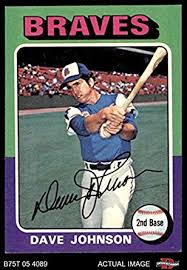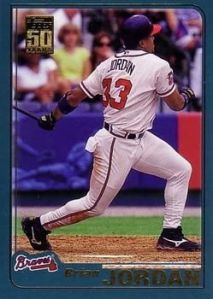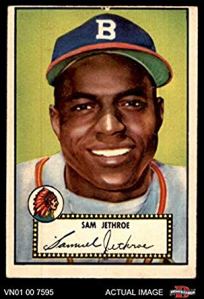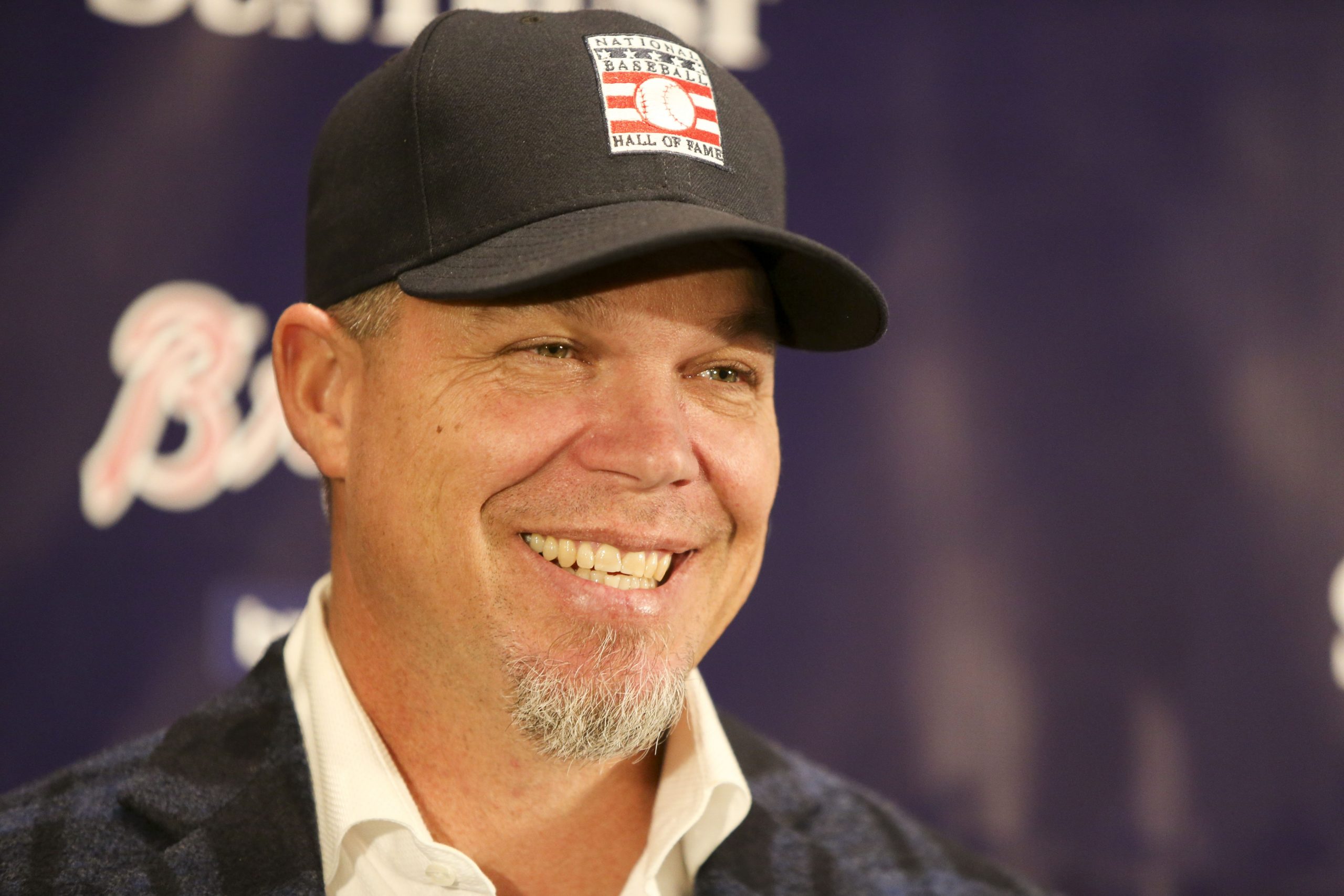Without much to write about as far as news goes for the Braves, let’s dive back into the series that attempts to find the best possible lineup of players whose last name begins with the same letter. When we left off, Team H had taken down Team G to become our champion. Team I was going to be next, but funny thing – there’s not enough players. There have been four players in franchise history whose last name begins with an I to play for the Braves. And while Ender Inciarte has amazing range and Omar Infante can play everywhere, I think you need more than four players to play a game.
So, let’s move to Team J and this squad will have more than enough players including a Hall of Famer from The Streak era. Will it be enough to take down the Billy Hamilton/Rogers Hornsby/Bob Horner/Tim Hudson-led squad that’s our current champion? Let’s dive in.
Just a reminder – I’ll drop a lineup and then go position-by-position before putting Preparation-H versus
1. Davey Johnson, 2B
2. David Justice, RF
3. Chipper Jones, 3B
4. Andruw Jones, CF
5. Brian Jordan, LF
6. Buck Jordan, 1B
7. Sonny Jackson, SS
8. Fred Jacklitsch, C
9. Bill James, P
RP Ernie Johnson Sr.
Bonus Choices
Owner – Eben Dyer Jordan
Utility Player – Kelly Johnson
Fourth Outfielder – Sam Jethroe
As always, we’ll talk about the decisions at each position before looking at whether Team J will be our new champion.
Catcher – Fred Jacklitsch
Alphabetically, Jacklitsch is first among the franchise J’s. There have been 61 J’s in franchise history. Sixty-one players to build this roster I’m using today. Jacklitsch makes our roster because of what happened on June 30, 1917. The Boston Braves fell 8-2 after the Giants rallied for all of their runs in the 7th to erase a 2-0 deficit. Jacklitsch played that day in relief of Walt Tragesser, who started behind the plate. Jacklitsch didn’t bat. Game data is tough, but I’m betting he was due up next when Red Smith was retired to end the game. It would be the only time a player whose last name begins with “J” played catcher for the franchise. That could change soon as Alex Jackson made it to Triple-A last season before also getting a spot on the 40-man roster. If he ever catches for the big league club, he’ll have the big shoes of Fred Jacklitsch to fill.
Just to put a bow on this, Jacklitsch was 41-years-old when he got behind the plate for the Braves. It was his 490th and last game in the majors. The next year, he was named by Walter Camp the Director of Recreational Sport at Prospect Park, where the Brooklyn Armed Guard was stationed. In 1922, Jacklitsch was to leave his post as Amherst College coach to become John McGraw’s pitching coach with the Giants, but later decided against it. But in my research, I never found out why he played one game with Boston in 1917 – two years after his brief two-year run in the Federal League and seven years after his last game in the majors with the Phillies. My assumption is that he was a coach for Boston and they needed a backup catcher that day. I could be wrong, though.
First Base – Buck Jordan
The options were minimal here as well. I gave consideration to Chris Johnson, who played more third base with the Braves. Ultimately, my choice is Jordan, who played parts of ten years in the majors – mostly with Boston in the early 30’s. In an era of increasing power, Jordan was your typical contact-driven first baseman. He hit a career-best five homers in 1935 and never struck out more than 22 times. Over 601 games with Boston, Jordan slashed .301/.342/.400. Not too bad for Baxter Byerly Jordan out of Cooleemee, North Carolina.
Second Base – Davey Johnson

Shortstop – Sonny Jackson
A left-hand hitter, Jackson was your typical middle infielder of the 60’s and 70’s known more for their glove than anything else. While with Houston, he arrived in the majors to stay in 1966, which was the only time he ever led the league in an offensive category – 27 sacrifice hits. He finished second in the Rookie of the Year ballot to Tommy Helms. After two years with the Astros, the Braves acquired him with Chuck Harrison for Denny Lemaster and Denis Menke shortly after the ’67 season concluded. Jackson spent the next seven years with the Braves – largely in a reserve/platoon role at shortstop. In 1971, the Braves make the decision to play Jackson regularly in center field between Ralph Garr and Mike Lum. The experiment lasted one year. He spent the next two years as a utility player and then a member of the 1974 Richmond Braves. He was cut that offseason and played two more years of minor league ball before moving into a coaching role. As a member of the Braves, Jackson hit just .243/.306/.300.
Third Base – Chipper Jones
I mean, I could have gone with Chris Johnson, right? A Florida prep star, Jones was a deserving choice for the top pick of the 1990 draft. Of course, Todd Van Poppel was also a deserving choice. But with super-agent Scott Boras, Van Poppel took his name out of the running and the Braves landed Jones. The two would face four times in the majors with Jones doubling once and striking out just as many times. Van Poppel retired in 2005. Jones kept playing until 2012, spending his entire career with the Braves and slashing .303/.401/.529 with 468 homers, an MVP, 2 Silver Sluggers, and a spot in Cooperstown.
Left Field – Brian Jordan

Center Field – Andruw Jones
Listen, I can already hear you now. “But Tommy, what about Dion James?” I understand your criticism. James did hit .283/.374/.402 over 329 games in a Braves uniform, but I’m going to go with the surprise pick despite the fact that Jones only hit a measly .263 as a Brave. With 368 homers. And ten consecutive Gold Gloves. And a franchise record for homers in a single season. And five trips to the All-Star Game. And did you know his middle name is “Rudolf?” But hey, if you want to go with James, I understand.
Right Field – David Justice
One of the saddest moments of my youth was when David Justice seized up after a swing in 1996. His shoulder was toast and he would need surgery. It would be the last time David Justice swung a bat for the Braves. And what a beautiful swing it was, too. One swing, in particular, led to Justice “turning jeers to cheers” as the old newspaper headline went. After being critical of Braves fans for not being as rowdy as the Indians faithful during the ’95 Series, he received his share of boos. Those stopped the second he drove a ball deep into the Atlanta night for his fourth World Series homer. It was all Tom Glavine and Mark Wohlers needed to beat the Indians in that Game Six matchup, handing the Braves their title they so sought. After hurting himself in ’96, he was traded the next spring. Braves fans have long hated the trade, though dropping both Justice and Marquis Grissom’s expensive contracts did help them afford Tom Glavine and Greg Maddux for the second half of the 90’s.
Starter – Bill James
Before there was a baseball stats pioneer – who also operates a rather strange twitter account – there was William Lawrence James, or “Seattle Bill” from California. It’s best to not focus on that for long. James had a brief, but eventful career. With great size and a tremendous heater, James was a spitball away from stardom. That came in 1912 and by the next season, he was already in the majors. Boston hadn’t posted a winning season since 1902 and that continued in 1913, but James had a great rookie year with a 2.79 ERA between work in the rotation and pen. The next year, the team was struggling into the early summer before catching fire – in no small part because of James. From July 9 to the end of the season, he won 19 of 20 decisions with a 1.51 ERA. He finished his first – and only – full season as a full-time major league starter with a 1.90 ERA. He then out-dueled Philly’s Eddie Plank in Game 2 of the World Series. Two days later, he pitched two extra innings frames to pick up a second win in the Fall Classic. Boston completed the sweep the next day. But his arm was never the same after 1914. He threw less than 70 innings in 1915 – likely a result of a torn rotator cuff and he was born in the wrong era to do much after that. He would make several comebacks, even pitching one game in 1919. It was his last game of his major league career. He finally called it a career in 1925 after repeated efforts to get back to the bigs proved fruitless.
Relief Pitcher – Ernie Johnson Sr.

Owner – Eben Dyer Jordan
There’s not much to say about Jordan. He co-founded Jordan Marsh department stores before it was eventually acquired by Macy’s. He was also one of a dozen or so owners of the Boston franchise in the 1870’s. Look, I didn’t see another J to go with here.
Utility Player – Kelly Johnson
One of my favorite players of all-time, KJ quickly showed he had a bat that had potential when he hit .289/.404/.513 for Macon back in 2001 as a 19-year-old. By 2005, he made it to the majors, hitting third in front of Chipper Jones and playing left field. After a rough start following his callup, KJ hit .241/.334/.397 for the 2005 Baby Braves as their regular left fielder. He’d miss the next year with injury, but had an All-Star-worthy 2007 (though he was snubbed). After another solid, but simply okay follow-up season, he struggled badly in 2009, losing his spot to Martin Prado. A non-tender followed and KJ quickly became a AL East staple after playing briefly with Arizona. He landed jobs with all five AL East clubs before returning to Atlanta in 2015 and 2016, each time getting dealt to the Mets for prospects. He hasn’t played since 2016 and hit .262/.340/.424 with the Braves.
Fourth Outfielder – Sam Jethroe

Best Team By Letter: Team H vs. Team J
Led by power hitters Rogers Hornsby, Tommy Holmes, and Bob Horner, Team H has some thunder. Billy Hamilton (not the Reds player) and Jason Heyward (the Braves version, at least) aren’t too shabby either. Tim Hudson was a solid arm while Fred Haney is one of just three managers in franchise history to win a World Series while in charge of the Braves. It’s a formidable mix, but can Team J challenge despite not having a manager? Oh, you bet they can. Despite being limited at some positions, Team J sports a tremendously talented outfield with Jordan, Andruw, and Justice plus Chipper and Davey on the infield. Bill James was one of the premier arms of his time as well. But I’m going to have to go with Team J. It’s a tough choice, but Team J’s outfield and having one of the best players in franchise history go a long way.
But what do you think? Should Preparation-H remain the team to beat or did the J’s deserve to win this one? Thanks for reading and remember to share this sucker if you liked it.
Add The Sports Daily to your Google News Feed!
